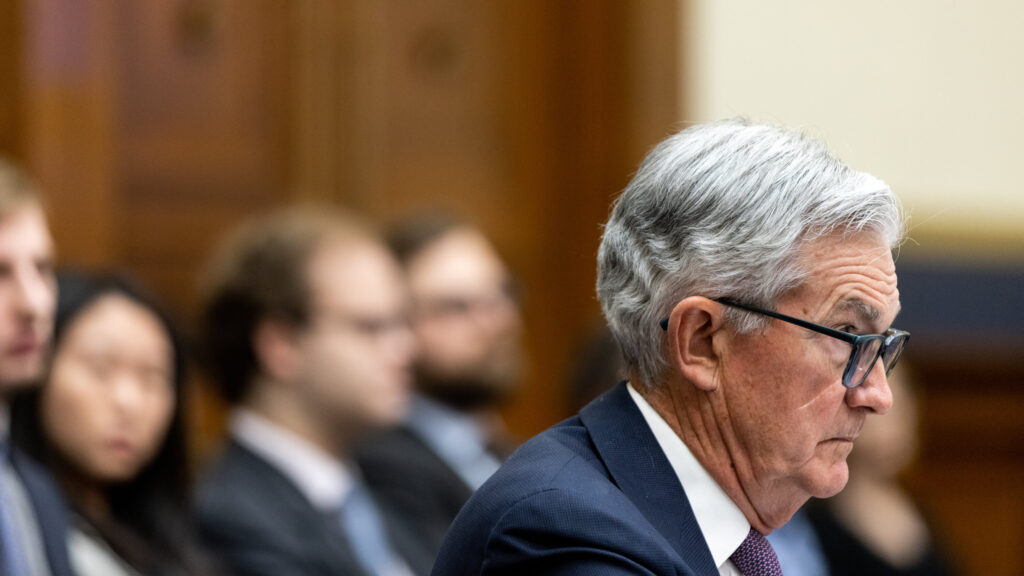The cryptocurrency market’s medium to long-term forecast had been “reinforced to the upside” amid ongoing market and banking chaos in the United States, a key Coinbase executive said on Friday.
David Duong, head of institutional research, said in the report,
“Cryptocurrencies have exhibited some resilience, in part due to technical reasons, [and more people] now appreciate the fundamental value proposition of having an alternative to the points of failure inherent in the traditional financial system.”
The news comes amid ongoing Federal Reserve rate hikes, which have triggered instability and belt-tightening across the banking sector.
Additional crises, including the collapses of Silvergate Bank, Signature Bank, Silicon Valley Bank, and now-defunct crypto platform FTX, have created further headaches for investors.
The report added that open trustless blockchain and smart contract technologies stood in “stark contrast to the poor risk management practices that led to the turmoil witnessed in the U.S. banking sector this week.”
The report concluded that its observations supported the “fundamental arguments in favor of digital assets as an alternative and solution to the points of failure witness in the existing financial system.”
The operating environment for cryptocurrency business could “be more challenging” due to fiat payment rail losses. It also expected further redundancies to enter force, “expanding the crypto ecosystem in more creative ways.”
HM Treasury has introduced declarations for cryptocurrency assets for future tax returns, it announced in a paper on Wednesday.
The new report, published for the national budget in Spring of this year, notes that the upcoming changes will enter force for 2024-2025. Taxpayers must declare their holdings in self-assessment forms.
People must report their holdings in the fiscal year 2025-2026 for the previous year. It is expected that the Treasury will profit up to roughly £10 million per year from the declarations.
This is a Budget which delivers on our priorities to halve inflation, reduce debt and grow the economy.
— HM Treasury (@hmtreasury) March 15, 2023
Watch Chancellor @Jeremy_Hunt explain the 6 big takeaways from today’s Budget.
Find out the details by clicking the video below ⬇️ pic.twitter.com/9zyyT6EdS0
The Chartered Institute of Taxation (CIOT) backed the changes, with its deputy president, Gary Ashford, stating: “Highlighting the need to declare crypto asset transactions in the tax return will help raise awareness of people’s obligations in this area.”
Despite this, he added that the government needed to implement measures to tackle “widespread ignorance” of cryptocurrency taxing and reporting.
The news comes after the Financial Conduct Authority (FCA) backed Parliament’s House of Commons to discuss the latter’s Financial Services and Markets Bill. The new legislation would provide the FCA expanded powers to regulate cryptocurrency firms and investors across the industry.
The UK has also launched numerous plans to regulate and outline cryptocurrency frameworks for future digital asset inclusion in the British economy. The UK treasury recently published a white paper detailing its plans for cryptocurrency regulations shortly before HSBC bought Silicon Valley Bank’s UK division for just £1, allowing Britain’s tech sector to prevent a collapse of funding for key tech firms.
Therapists providing therapy to people addicted to gambling have spotted a sharp rise in addicts seeking help over cryptocurrency speculation, reports show.
An ITV News report found that cryptocurrency investing became more popular during COVID-19 pandemic lockdowns.
One man interviewed by ITV said, “As it was going on, it was having more of an effect because I was putting a lot more money into it. I was investing before but then after I was gambling. I was just watching this coin go up and down with any money I’d got. I was doing it as a day trade rather than like leaving it for a year or something.”
He added that he would frequently invest in cryptocurrencies to “make quick money,” but soon began to obsess over trading.
“I was constantly on my phone, constantly looking at it, just detached from everyday life,” he said.
Castle Craig rehab centre therapist, Tony Marini, said he had seen roughly 200 people hit by crypto trading addictions since 2016. Many addicts were young men affected by the pandemic and isolation from national lockdowns, he alleged.
Marini explained that he had researched over the last six years, speaking to many people and found similar behaviours and addictions to gambling.
He said: “The isolation, the fantasies about making money, being able to get the fast cars, the big houses, and then that depression starts to come in. You know, they crossed that line into the addiction and they isolate away from everybody. They start telling lies.”
According to Castle Craig, such addictions affect 9 out of 1,000 people while “a further 70 people out of every 1000 participate at risky levels that can become a problem in the future.”
Bitcoin has stumbled under $20,000 after several backtracks in the crypto market, just after a massive surge in prices across 2023.
Thursday saw Bitcoin’s market capitalisation fall 7.7 percent compared to the previous day, data from Trading View showed.
Similar trends took place in November 2021, when Bitcoin plummeted from $69,000 USD to $16,600 up to early 2023. External influences included the collapse of FTX, Voyager Digital, Genesis, and Terra/Luna.
Despite this, Bitcoin and numerous cryptocurrencies surged in February this year, with the former topping $25,000. However, later in the month, the United States Federal Reserve revealed high levels of inflation that would require greater-than-anticipated efforts.
Fed Reserve chair Jerome Powell aimed to reduce inflation to 2 percent to stabilise the economy.
Recently Silvergate Bank also collapsed due to its ties to disgraced cryptocurrency exchange FTX and its subsidy, Alameda Research. The former facilitated the latter’s payments despite filing for Chapter 11 bankruptcy on 11 November, just days after receiving assistance from Silvergate Bank.
Numerous cryptocurrency exchanges such as Coinbase, Gemini, and others have severed ties with the troubled bank. The Biden administration said that it was aware of the situation and would continue monitoring the Silvergate collapse closely.
United States Federal Reserve chairman Jerome Powell offered his thoughts on the cryptocurrency industry at a Tuesday Senate Banking Committee meeting.
He hoped the Web3 technology could feature “productive innovation that makes lives better” and that the Fed did not want to “stifle innovation.”
In his statement, he said,
“We have to be open to the idea that – somewhere in there – there is technology that can be featured in productive innovation that makes people’s lives better […] We don’t want to stifle innovation.”
Powell and the Crypto Space
The news comes after Powell discussed concerns over the cryptocurrency industry in his two-day testimony, which is set to continue up to Wednesday.
He added that the Fed had seen a “remarkable set of events in the crypto space” and “quite a lot of turmoil” over the last year due to multiple fraud and bankruptcy cases.
He added: “We see in crypto activity lots of things that suggest that regulated financial institutions should be quite cautious in doing things in the crypto space.”
The news comes as banking regulators in the US have cracked down on cryptocurrency firms such as now-defunct crypto exchange FTX, Voyager Digital, Genesis, and Terra/Luna, among others.
Additionally, Silvergate Bank proved risky to the crypto and banking industries after regulators found it had facilitated transactions for FTX days before the latter collapsed into bankruptcy.
A Workable Framework?
Speaking further, Powell called for a “workable legal framework” for US digital assets, adding,
“People are going to assume when they deal with something that looks like a money market fund that that has the same regulation as a money market fund or a bank deposit. So stablecoins need some attention in that respect.”
Concluding, he said that stablecoins could continue in the financial sector with “appropriate regulation.” Ha added that there were “real concerns about permissionless public blockchain” which were “so susceptible to fraud, to money laundering and all of those things.”
The United States’ first nuclear Bitcoin mining plant, the Nautilus Cryptomine, is now home to TeraWulf (WULF) cryptocurrency mining operations.
It currently has 8,000 functioning mining rigs operating at 1.0 exahashes per second (EH/s), it said in a press release on Monday.
TeraWulf hopes to have a further 8,000 machines over the next few weeks to boost capacity to 1.9 EH/s, it added.
The company added it had energised around half of its 50-megawatt stake in the Cryptomine facility in a joint venture with Cumulus Coin LLC.
The Nautilus Cryptomine is set to slash TeraWulf energy costs. According to the statement, the latter secured a 2 cents per kilowatt hour (kWh) deal with the facility for five years.
This aims to cut energy consumption costs to around 4 cents per kWh at its two locations. TeraWulf typically pays 5 cents per kWh at its New York site.
Nuclear-Backed Bitcoin?
The news comes as the mining enterprise faced several issues in recent months such as plummeting crypto prices and higher energy costs.
TeraWulf chairman and chief executive Paul Prager said that roughly 16,000 company miners representing 1.9 EH/s of self-mining capacity were “onsite and being brought online daily.
He concluded,
“The Nautilus nuclear-powered mining facility benefits from what is arguably the lowest cost power in the sector, just $0.02/kWh for a term of five years […] We look forward to continuing to work alongside Cumulus Coin as the Nautilus facility increases operational hash rate in the coming weeks.”
Cryptocurrency automatic teller machines (ATMs) have plummeted in numbers since the start of the year. Fresh reports have found that the number of functioning ATMs has been slashed by 412 units.
The news comes amid an uptake of new crypto ATM machines across the world, with nearly 1,000 new units installed each month globally from December 2020 to January 2022. However, these numbers have declined significantly due to the ongoing bear market.
In September last year, crypto cashpoints nosedived, followed by record lows in January and February. January saw a drop of 289 ATM machines and an additional fall of 123 machines last month.
Other factors such as BitAccess software are competing with crypto ATM machines. This works by reducing operating costs of physical devices and software licencing fees, saving roughly $3 million USD each year.
The news comes after numerous countries began deploying ATMs nationwide, with the United States, Canada, and Spain topping the global list. The three nations have installed 33952, 2649, and 273 machines, respectively.
Despite regulatory crackdowns on cryptocurrency platforms, authorities have also begun cracking down on ATMs operating illegally. In the United Kingdom, police have tackled ATMs operating without licencing across Leeds and Yorkshire. This has also reduced the number of operational ATMs in the country as the nation pushes for central bank digital currencies (CBDCs) and regulatory frameworks.
Bitcoin watchers have seen the cryptocurrency jump to roughly $25,000 after the crypto market capitalisation reached $1.17 trillion, reports showed.
The price of the cryptocurrency king hit $24,500, a 12.4 percent increase from last week. Ethereum, the second-biggest digital currency by market capitalisation, topped $1,689 USD, an 11.7 percent spike from last week.
Additional virtual currencies rose along with BTC, with Solana, Polkadot, and Polygon gaining 20 percent, 19 percent, and 18.5 percent, respectively.
One user stated that BTC could potentially reach $27,000 USD shortly with a candle formation.
Degen Ape Trader said at the time: WIf this red line get smashed. We may see a $btc god candle to 27k area in a short time. Basically no resistance till 27-28k for #btcusdt after 25250.”
Crypto Market Triggers
The news comes after massive fluctuations took place due to US Federal Reserve and Securities and Exchange Commission disruptions in the crypto economy.
According to reports, Bitcoin hovered earlier this month around $23,000 USD after the Fed launched several interest rate hikes to tackle ongoing monetary inflation.
Additional concerns with the SEC lawsuit against cryptocurrency giant Binance, whom the regulatory body accused of selling crypto-related securities. News of the litigation, linked to Paxos-minted Binance USD (BUSD), triggered massive net outflows of roughly $831 million USD at the time.
Dubai, UAE, 17th February, 2023, Chainwire
The 10th Global Forum on blockchain, cryptocurrencies and mining – Blockchain Life 2023 takes place on February 27–28 in Dubai.
The event is attended by key industry players, government representatives, heads of international companies and funds, investors, promising startups teams and beginners. It’s noteworthy that the Forum is a meeting point for a premium crypto audience including world Crypto Whales.
What to expect?
- Whales of the crypto industry at one place
- Top speakers with world-changing insights and analytics
- Global expo of the latest Web 3.0 technologies
- Breakthrough smart networking app
- The legendary AfterParty on the luxury yacht trip
Top speakers:
- Yat Siu – Co-Founder and Executive Chairman of Animoca Brands, Founder and CEO of Outblaze
- Sergei Khitrov – Founder of Listing.Help and Jets.Capital
- Ben Zhou – Co-founder and CEO of Bybit
- Dr. Marwan Alzarouni – CEO of Dubai Blockchain Center
- Carl Runefelt – Crypto Entrepreneur, Founder Of CryptoJobs.com
- Chris MMCrypto – Cryptocurrency Expert, Co-Founder of MMCrypto
- Gabriel Abed – Ambassador of Barbados to the UAE
- Dr. Mohamed Al Hemairy – Director of Technology Transfer Office at University of Sharjah, Blockchain & Crypto Advisor
- Manan Shah – Founder and CEO of Avalance Global Solutions and CyBirb
- Gracy Chen – Managing Director of Bitget
Where and when?
February 27 – 28, Dubai, Atlantis the Palm.
Buy a ticket with a 10% discount now using promo code 2023 here.
Contact
Media manager
Andrey Tretyakov
Blockchain Life
infopartners@blockchain-life.com
The Financial Conduct Authority has launched a crackdown on suspected illegal cryptocurrency cashpoints across Leeds.
The crypto machines are not registered with the FCA to operate in the country, it said in a recent press statement. It added that it worked with authorities such as the local police to remove the machines.
Despite this, the FCA does register services for buying digital assets on an app or bank transfer service, where customers can withdraw funds from cashpoint ATMs.
According to a Whitehall report, cybercriminals used the machines as “money mules” to launder money.
Comments on Crypto Cash Machines
Det Sgt Lindsey Brants, Head of the West Yorkshire Police Force Cyber Team, said in a statement:
“Having conducted intelligence-gathering work across West Yorkshire, we soon established the locations of several live crypto ATMs […] We are pleased to be able to work in partnership with the FCA in what we believe is a national first here in West Yorkshire.”
Authorities warned crypto machine operators to stop using the devices, adding that money laundering breaches would trigger investigations, with the FCA receiving updates. Crypto operators facing charges could receive up to two years in prison.
Mark Steward, Executive Director of Enforcement and Market Oversight at the FCA, said:
‘Unregistered Crypto ATMs operating in the UK are doing so illegally. We will continue to identify and disrupt unregistered crypto businesses operating in the UK. Crypto businesses operating in the UK need to be registered with the FCA for anti-money laundering purposes.
Steward added that crypto products were “currently unregulated and high-risk, and you should be prepared to lose all of your money if you invest in them.”










